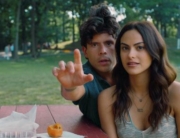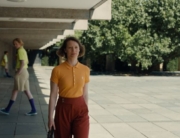
The Punch Brothers in the studio (Mark Meatto/Shaftway Productions)
How to Grow a Band has a promising story to follow. A young, gifted musician rises from a narrow genre to commercial success, falls into personal turmoil, and finds catharsis with a new mode of artistic expression. But this uneven profile of Chris Thile, as he moves from bluegrass stardom with Nickel Creek to the more eclectic Punch Brothers, is disappointing, either as an introduction to progressive bluegrass or for longtime Thile fans.
Early on, clips from home movies and family performances charmingly show Thile as a child prodigy playing the mandolin. From ten years old on, and for the next 15 years, he and the similarly young Watkins’ siblings constituted Nickel Creek, along with Thile’s father on bass, who were stars of the bluegrass scene before they crossed-over up the country charts. Their wider popularity is attributed here to the O Brother, Where Art Thou (2000) boom, which featured other interpreters of traditional instruments, such as Allison Krauss, who produced two of their top-selling albums.
Thile vaguely explains, “We lost control of the mechanism,” juxtaposed to clips from their last concert in January 2007. His friends describe phone calls at that time that he was in bad shape as his marriage also fell apart.
Director Mark Meatto joins Thile in the U.K. in 2008 with his new band, the Punch Brothers, on their opening tour to support their first album Punch, but the film’s audience has to fill-in that Thile went from the comfort of a Nashville tour bus to the scrunch of a band van. Insights into his personal life are only revealed through the lyrics of his ambitious new work, “The Blind Leaving the Blind,” a 40-minute, four-movement suite for mandolin, fiddle, banjo, guitar, double bass, and his high lonesome voice.
There is no audience conflict, like when Dylan went electric—fans are attracted anyway by Thile’s reputation and appreciation of his talent. (I’ve seen Thile perform in several of his permutations in the company of his loyal following.) His band mates are also from notable “newgrass” groups—Chris Eldridge on guitar, Noam Pikelny on banjo, Gabe Witcher on fiddle, and Greg Garrision on double bass. Nor is there much in the way of conflict among them, other than some jealousy about whether they are perceived as “Chris Thile and the Punch Brothers” and the degree of collaboration on Thile’s compositions. About all we learn about the other members’ lives is when Garrison explains his decision to stay with his family in Colorado rather than join Thile near his new home in New York City. (He was replaced by Paul Kowert.) Thile’s geographical re-planting is left unexplored.
Interviews with Thile’s very varied collaborators and musical legends could have made up for his on-camera reticence, but dobro master Jerry Douglas, rocker John Paul Jones, cellist Yo-Yo Ma, bassist/composer Edgar Meyer, and ex-Nickel Creeker Sara Watkins add fairly general praise and sympathy for the pitfalls he faces. The film finally comes into focus only with the full performances of the last two movements of “The Blind Leaving the Blind” near the end of the film. Set to Thile’s poetically impressionistic lyrics, the suite reinvents the modes set by the late Bill Monroe and Ralph Stanley, who matched mournful Appalachian ballads and Christian gospel with incongruously high-spirited, flying fingers instrumentation. Instead, the Punch Brothers take the same instruments out of what had become a stereotyped framework to express very contemporary, introspective feelings, with big city references, as in the lyric “Goodwill’s coming by to collect a box/I filled with things I hate about myself.” Yeah, the piece is a downer, but it is exquisitely performed with a jazzy interaction among the band members, and it becomes uplifting. Too bad this documentary doesn’t delve deeper.






Leave A Comment